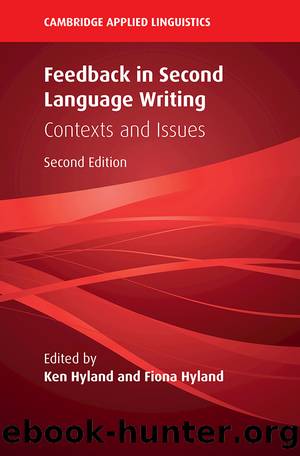Feedback in Second Language Writing : Contexts and Issues (9781108696975) by unknow

Author:unknow
Language: eng
Format: epub
ISBN: 9781108425070
Publisher: CambridgeUP
Published: 2019-03-29T00:00:00+00:00
Contingently Responsive Feedback
As the above examples show, peer feedback in collaborative writing is often contingently responsive; that is, it is made directly in response to an identified need for assistance. That need can be expressed in the form of a request for assistance (e.g., Excerpts 4, 5), a confirmation request (e.g., Excerpt 1) or evident when an error is noticed in the evolving text (e.g., Excerpts 1, 2, 3). In peer-response activities, feedback provided is often guided by predetermined checklists (e.g., Min, 2005) which cover structures that may not correspond to the writerâs perceived needs.
Furthermore, this assistance is expedient, it is provided immediately when it is needed and it is available throughout the composing process. From a sociocultural theoretical perspective (see Villamil & Guerrero, 2006; Bitchener & Storch, 2016; this volume), timely and contingently responsive feedback are among the distinguishing attributes of effective feedback for language development. The metaphor commonly used to describe this form of assistance is scaffolding (Wood, Bruner, & Ross, 1976).
In comparison, feedback provided during peer-response activities (and teacher feedback) is provided on the product (written draft). This means that the writing process remains a private act, and writers have to rely largely on their own linguistic resources to resolve any difficulties or uncertainties they encounter during the composing process. Manchón, de Larios, and Murphyâs study (2009), using think-aloud protocols generated by EFL learners composing individually, shows that learners put a great deal of effort in their deliberations about language choice and about how best to express their ideas during the composing process. The researchers note that the learners drew on their existing knowledge to resolve their deliberations rather than generating new knowledge. In collaborative writing, the writers can draw on a bigger pool of resources, as each learner may have different areas of expertise. In collaborative writing, unlike solitary writing, learners have opportunities to learn new words (see Excerpts 4, 5) and alternative forms of expression (see Excerpt 3).
In collaborative writing, the feedback can also draw on the writersâ combined expertise, in a process termed âcollective scaffoldingâ (Donato, 1994), where the assistance provided is bidirectional. Excerpt 6 shows this process, whereby learners pool their linguistic resources and reach resolutions that they could not have reached had they been composing alone. The excerpt comes from the study by Fernández Dobao (2012) conducted with intermediate learners of Spanish in a university in the USA. English translations are given in brackets.
Excerpt 6: Collective scaffolding
1 David: u:h ⦠lluvÃa ⦠or llov-[uh ⦠it rained ⦠or it rain-]
2 Mark: llu-[rain-]
3 Anne: llu-[rain-]
4 Mark: llo:vó ?[it rained (preterit)]
5 Sarah: llovió ?[it rained (preterit)]
6 David: llo: [rain-]
7 Sarah: llov- [rain-]
8 David: or llovÃa[or it rained (imperfect)]
9 Mark: llovÃa ⦠⦠mucho[it rained (imperfect) ⦠⦠a lot]
10 David: llovÃa ⦠mucho[it rained (imperfect) ⦠a lot]
Download
This site does not store any files on its server. We only index and link to content provided by other sites. Please contact the content providers to delete copyright contents if any and email us, we'll remove relevant links or contents immediately.
The European Opportunity by Felipe Fernández-Armesto(569)
The European History Highway: A Guide to Internet Resources by Dennis A. Trinkle Scott A. Merriman(535)
Morgan Kaufmann Digital Watermarking and Steganography by Ingemar Cox Matthew Miller Jeffrey Bloom Jessica Fridrich Ton(528)
The Seven Wonders of the Ancient World by Michael Denis Higgins(521)
Hyperculture by Byung-Chul Han(509)
European Security without the Soviet Union by Stuart Croft Phil Williams(506)
European Security in a Global Context by Thierry Tardy(505)
The Routledge companion to Christian ethics by D. Stephen Long Rebekah L. Miles(498)
Get Real with Storytime by Julie Dietzel-Glair & Marianne Crandall Follis(443)
Hudud Al-'Alam 'The Regions of the World' - a Persian Geography 372 A.H. (982 AD) by V. V. Minorsky & C. E. Bosworth(436)
Gorbachev And His Generals by William C. Green(429)
Tibetan Studies in Comparative Perspective by Chih-yu Shih Yu-Wen Chen(427)
Governance, Growth and Global Leadership by Espen Moe(418)
How Languages Are Learned 5th Edition by Patsy M Lightbown;Nina Spada; & Nina Spada(407)
CliffsNotes on Fitzgerald's The Great Gatsby by Kate Maurer(400)
The Oxford History of the World by Fernández-Armesto Felipe;(388)
The Egyptian Economy, 1952-2000 by Khalid Ikram(379)
Oral Poetry and Narratives from Central Arabia: The Poetry of Ad-Dindan : A Bedouin Bard in Southern Najd (Studies in Arabic Literature, Vol 17) (English and Arabic Edition) by P. M. Kupershoek P. Marcel Kurpershoek(365)
The Oxford Handbook of the Incas by Sonia Alconini(364)
